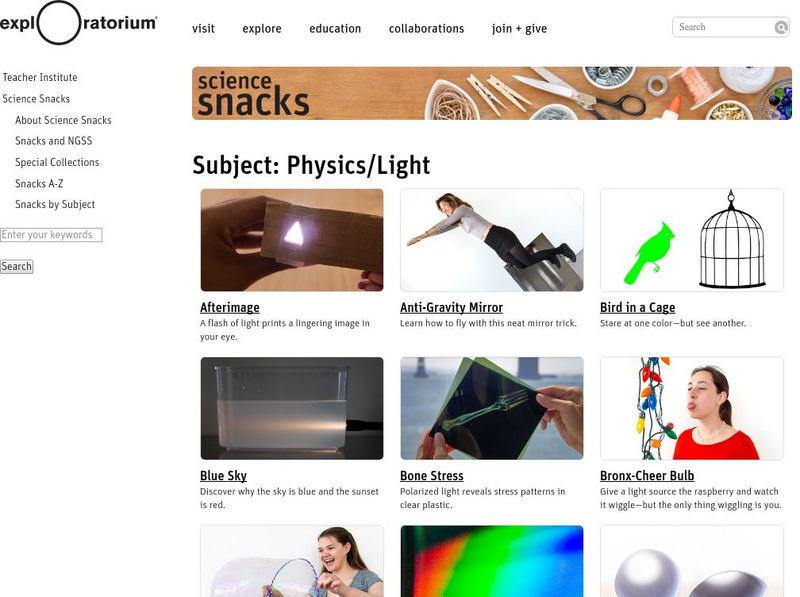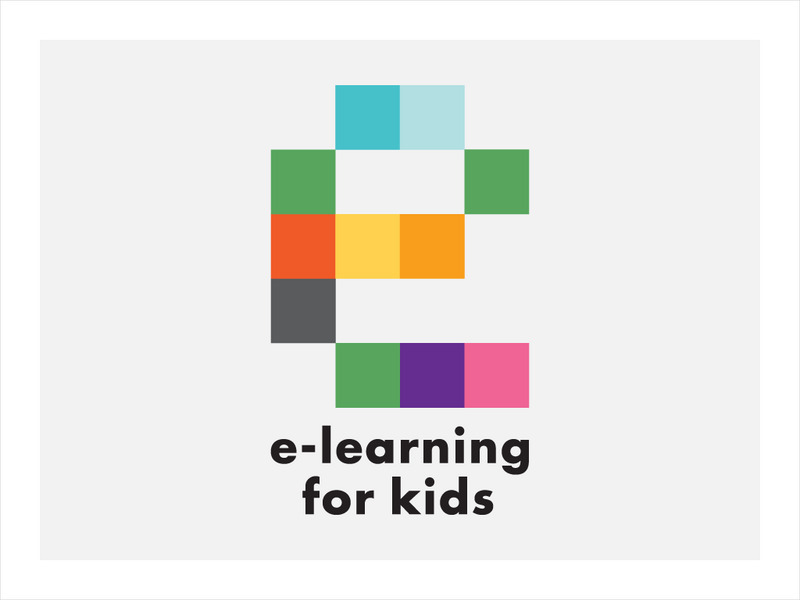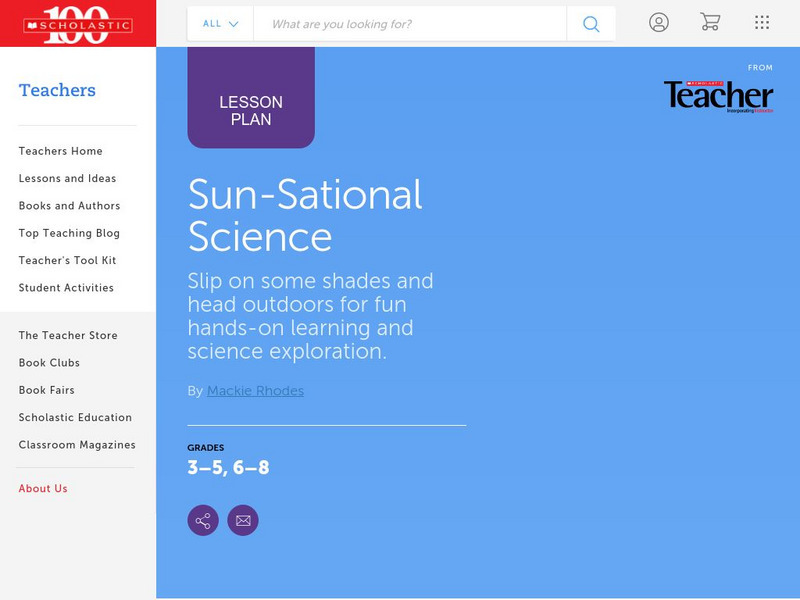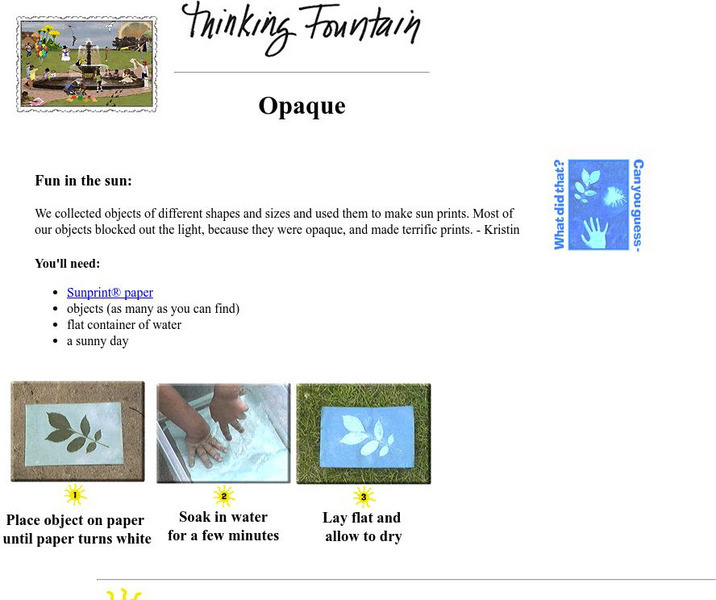Curated OER
Tune Up Your Ears!
Learners discuss meaning of pitch, listen for different sounds in classroom, hallway, and outdoors, and listen to sounds played on piano and on computer to determine high or low pitch.
Project Britain
Primary Homework Help: Light and Shadows Quiz
This resource provides information about light and shadows. In addition, there is a short quiz that can be taken.
Science Buddies
Science Buddies: Technicolor Shadows: Lessons in Light and Color
Is that right side of your brain yearning to express its artistic side? This is a project that blends art with science. Learn about light and colorful shadows in these experiments where you mix and match various colors of light to create...
E-learning for Kids
E Learning for Kids: Science: Denmark: How Does Light Help Us See Things?
Isabella and Amalie are in Copenhagen, and they saw a periscope in the water. Join them, and find out what this is all about. This module discusses how to use a periscope, what light sources are, and how light impacts shadows.
Discovery Education
Discovery Education: Science of Everyday Life: Light and Shadow [Pdf]
For this lesson plan, students experience how light interacts with the environment by investigating relationships between shadows and light. Students will experiment with light by observing how light travels through materials and distances.
Exploratorium
Exploratorium: Science Snacks: Colored Shadows
Learn about additive mixtures in this activity. Understand how your rods and cones work together to see color.
Exploratorium
Exploratorium: Science Snacks: Physics/light
Here is a large collection of simple science class activities for understanding the physics of light.
Science Museum, London
Science Museum: 3 D Shadows
In this activity students can make a pair of coloured glasses, which allows them to see coloured shadows in 3D. Students will learn what shadows are and how they are produced.
E-learning for Kids
E Learning for Kids: Science: Winery: Why Can We See Through Some Objects but Not Others?
Learn about the properties of materials in their interactions with light, including whether they are opaque, transparent, or translucent, and which of these produce shadows.
Annenberg Foundation
Annenberg Learner: Colored Shadows
Manipulate dual shadows and learn why different types of shadows are cast.
Exploratorium
Exploratorium: Science Snacks: Shadows: The Shadow Knows
This science experiment helps students understand how the size of a shadow depends on the size of the object casting the shadow as well as the position of the light source and screen.
E-learning for Kids
E Learning for Kids: Science: Denmark: What Are Light and Darkness?
In this module, students learn about the different sources of light, what causes darkness, and about shadows.
E-learning for Kids
E Learning for Kids: Science: Scotland: Why Do Shadows Change During the Day?
William is a Scottish boy who is learning about the sun and how it casts shadows. Try to help him find out.
CK-12 Foundation
Ck 12: First Grade Science: Me and My Shadow
[Free Registration/Login may be required to access all resource tools.] Explores how light interacts with objects in order to create shadows.
Scholastic
Scholastic: Study Jams! Science: Energy, Light and Sound: Light
A video and a short quiz on the basic concepts and vocabulary for understanding light energy.
CK-12 Foundation
Ck 12: First Grade Science
This customizable digital textbook covers topics related to first-grade science. It is Next Generation Science Standards (NGSS) aligned.
Other
Center for Science Education: Eye on the Sky: What Makes Shadows?
Learners will enjoy these activities where they draw shadows, and observe the sun's placement and how its position impacts on the size of a shadow.
Annenberg Foundation
Annenberg Learner: Where Is the Player?
Examine how multiple light sources produce shadows of differing darkness and length. Move a player (with four light sources) around the field until your image matches the five other images on the page so you can identify where the player...
Annenberg Foundation
Annenberg Learner: The Science of Light: Light in Color
Site explores colors and how they are formed. Provides three different activities to explore color.
Louisiana Department of Education
Louisiana Doe: Louisiana Believes: Ela Unit: Grade 1: Mooncake
First graders learn factual information about the moon and how light creates shadows. Noting that authors oftentimes use their imaginations to create stories, 1st graders explore how misconceptions and misunderstandings can often be...
CK-12 Foundation
Ck 12: First Grade Science
[Free Registration/Login may be required to access all resource tools.] A science text for Grade 1. Section titles include: Me and My Shadow, How Do I See, My Features Can Help Me, Signals Light and Sound, Sky Patterns, Telescopes, The...
E-learning for Kids
E Learning for Kids: Science: Scotland: How Are Shadows Formed?
Join James, as he tries to make a dog appear on the wall by using only his hands. Find out how he does this.
Scholastic
Scholastic Instructor: Sun Sational Science
Discover more about the sun when you visit this educational resource. The content of this site includes solar fun facts, experiments, and activities.
Science Museum of Minnesota
Science Museum of Minnesota: Thinking Fountain: Opaque
In this lesson use objects found around the house or classroom to make sun prints. Link provided for the construction of a light island for classroom use.



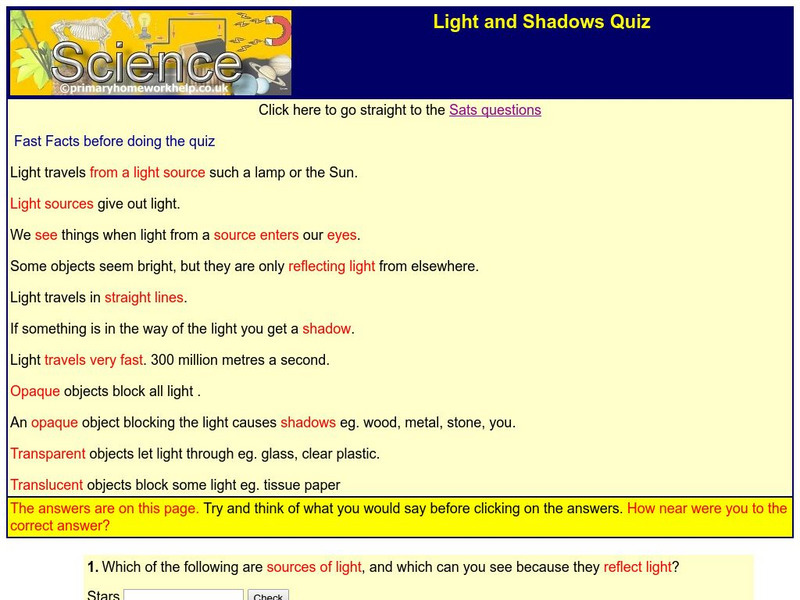


![Discovery Education: Science of Everyday Life: Light and Shadow [Pdf] Lesson Plan Discovery Education: Science of Everyday Life: Light and Shadow [Pdf] Lesson Plan](https://d15y2dacu3jp90.cloudfront.net/images/attachment_defaults/resource/large/FPO-knovation.png)

